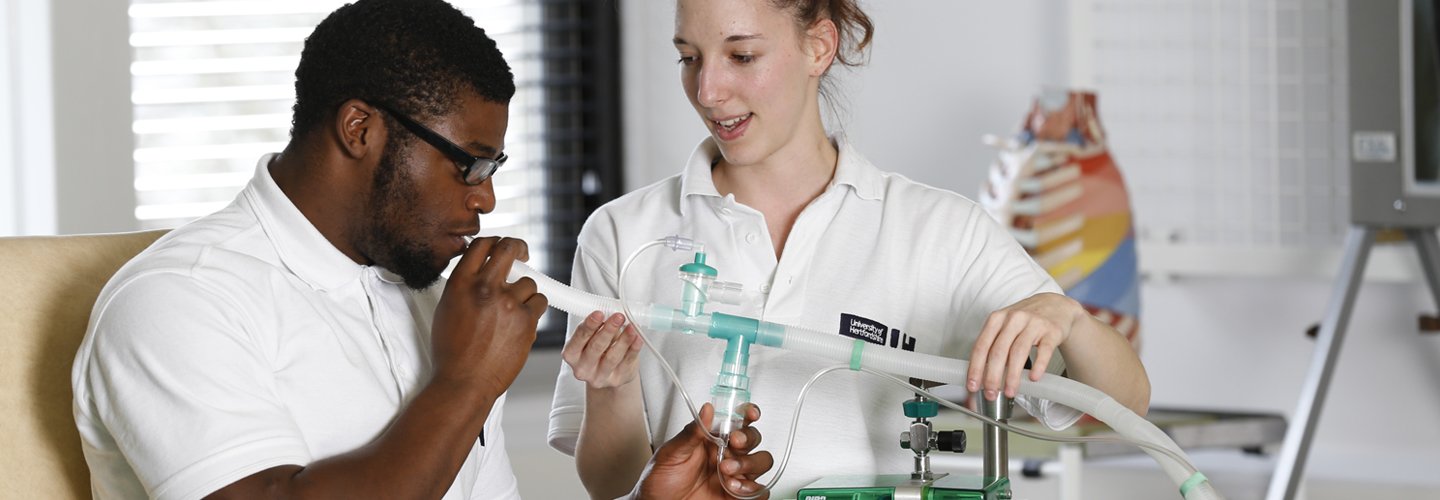Abigail Martin takes her health technology research global
University of Hertfordshire PhD student Abigail Martin has returned from the trip of a lifetime, after exhibiting her cutting-edge health technology research across the world.
Abigail’s PhD research project has led to the development of a 3D model human lung that can be grown in a laboratory. The technology allows for the respiratory testing of any sort of chemical or particles that we might inhale. Scientists and researchers can use the test results to measure the extent of the damage that these substances can cause and determine the concentration that might be considered safe. This has worthwhile potential applications across a range of industries relating to pollution, agricultural chemicals, asthma, paint inhalation, as well as minimising the use of animal testing.
Abigail was accepted into Innovate UK’s Innovation to Commercialisation of University Research (ICURe) programme for the South England region after being approached by University of Hertfordshire Associate Dean (Business and Enterprise), Prof. Darragh Murnane, to apply. The ICURe journey began with an intensive 12 week programme that enables a cohort of innovators to validate a market for their technology.
“The programme starts with a week long intensive bootcamp,” says Abigail. “You’re given support with deciding the value proposition of your technology and advice on how to network with people to encourage you to actively go out and spread the word about it. You then do a pitch for a significant amount of funding to be used to travel the world and talk about your technology. After being successful in my pitch, I put together a schedule of tradeshows and exhibitions that I identified as addressing my key markets, and I set off.”
Abigail went on to make connections across four continents, visiting eight countries including the United States of America, France, Spain, Scotland and Belgium and taking part in upwards of 120 meetings, all of which enabled her to speak specifically to relevant contacts within the life sciences and pharmaceutical markets.
“In academia you don’t usually get a chance to go out and test if there is a market for academic inventions, and the opportunity to do this was invaluable in letting me evaluate my technology and how it might be used. I got to exhibit at tradeshows and industry conferences attended by anywhere between 100 and 45,000 people and ask them about the problems they face with current lung models, what works and doesn’t work for them, and identify ways in which we could improve the technology.”
“The experience itself was so empowering. At first it was challenging to gain the confidence to approach people and be assertive, especially coming in as a young female in quite a male dominated industry. But over the course of the programme and my time abroad, my confidence grew a lot and people were really welcoming and open to hearing from me. It was a great feeling, being able to bridge the gap between academia and industry.”
“It was really reassuring to see that 25 percent of my ICURe cohort was female. We need to see more women and young people out there pushing their technologies and themselves.”
Following the 12 week programme, Abigail delivered a pitch to Innovate UK and venture capitalists in order to progress into the next step of the programme. “After receiving positive feedback on my pitch, Innovate UK provided me with another 3 month salary and I was able to attend another business bootcamp, preparing me to move past market validation and into writing a business plan and raising capital.”
Don Spalinger, Director SETsquared ICURe Programme, said: “Abigail really exemplified what we have developed the SETsquared ICURe programme to do, which is to get the researchers out of the lab and into the marketplace to validate that their research results are addressing burning needs. She embraced the training she was given at the ICURe Bootcamp and then went out and held over 100 discussions with companies. She found that a number of these companies really needed the 3D human lung model, and she is now moving forward in commercialising it.”
The next steps towards commercialisation
As she works towards completing her PhD, Abigail has also submitted an application for another Innovate UK competition for follow-on funding, with the help of her PhD Supervisor Dr. Victoria Hutter and the University’s Business Development team.
“This round of funding would provide up to £300k! We’re hoping that with the further investment, we’ll be able to launch a spin out company from the technology, or if not, license it out. This isn’t something I would have been able to do, especially so quickly, had I not taken part in the ICURe programme. It enabled me to build on my entrepreneurial skills and in fact, I was being approached with job opportunities almost weekly, from people that I met at various conferences and events. I would definitely recommend it."
Prof. Darragh Murnane, commented: “The University is proud to support talented researchers like Abigail in the development of their technologies and innovations, with real world implications. We’re huge advocates of inspiring our students to look beyond the realms of academia and to be enterprising and industry driven; Abigail is a perfect example of how rewarding and successful this can be.”
Find out more
The University is committed to providing ongoing support for academics and researchers in Hertfordshire to develop technologies and commercially viable products.
Contact be@herts.ac.uk to learn more.
